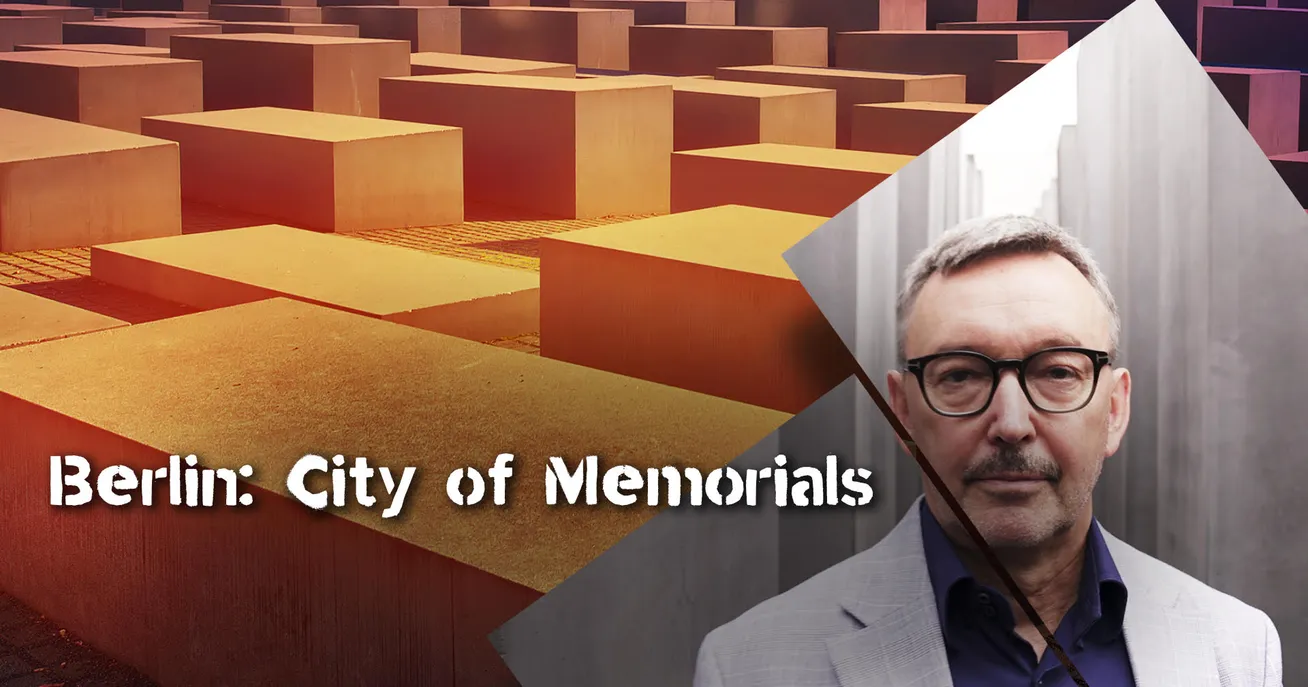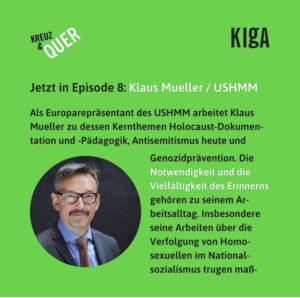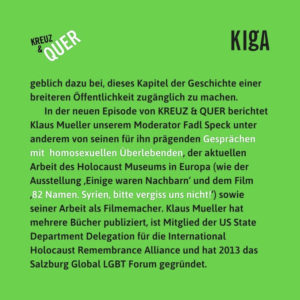Hear Our Voices: Holocaust Survivors Share their Stories of Trauma and Hate is a bilingual online course that uses the voices of Holocaust survivors to educate students on the Holocaust and Antisemitism. The course is accessible online and consists of four modules: Oral History, Gender and Sexuality, Religion and Culture, and Antisemitism and Racism.
I was invited by the wonderful team developing HEAR OUR VOICES to reflect on the significance (and shortage) of LGBTQ+ testimony, including oral history and diaries, in Holocaust studies. It was such a pleasure to work with them and and I especially thank Dr. Deirdre Butler, Marie-Catherine Allard and Noë Bourdeau for this opportunity. The below interviews extend to multiple questions they raised: on how to conduct oral history interviews; the motives behind my work of interviewing gay and lesbian survivors and eventually turning this into the documentary film ‘Paragraph 175’; and the importance of further examining how people lived their lives who were persecuted under multiple identity categories by the Nazi regime, such as Jewish homosexuals. Sharing how I met Jewish LGBT resistance fighters Gad Beck and Frieda Belinfante and how my interviews with them changed me, we talked about missing and recovered voices. Having just finished an article that documents the last 30 years of my work with queer survivors, I gladly offered to publish this reflection within this frame: The Men With the Pink Triangle: voices lost, voices recovered (also HERE) Please find below a brief overview of my contributions.
Guest Lecture: Dr. Klaus Mueller is a historian and filmmaker who specializes in the history of the persecution of homosexuals under Nazi rule. He conducted pioneering research on and interviews with gay survivors of Nazi persecution. This section discusses the evolution of testimony collected on the experiences of Jewish survivors. Other groups that were persecuted by the Nazis also had to overcome cultural taboos, structural inequalities, and other factors that made it difficult to recount what they had lived through. In this short video, Klaus Mueller talks about the challenges in interviewing homosexual victims of Nazism, and what it took to collect their stories for the first time.
Guest Lecture: In this lecture, Dr. Klaus Mueller shares his personal journey towards finding gay survivors and developing a relationship of trust with them that allowed them to share their story, often for the first time. Dr. Mueller talks about the necessity for deep listening, flexibility, and attention to survivors’ particular needs when interviewing homosexual survivors of the Holocaust. He explains how he learned from his interviewees how he had to listen to these stories.
Guest Lecture: In this clip, Dr. Klaus Mueller invites us to ask, what is Paragraph 175? What do we know about the Nazi persecution of gay men during the Holocaust? And what was the stand of the Nazi regime towards lesbian women? This clip reminds us of the fragility of progress, of minorities within history that are often forgotten or subjugated, and provides us with context for the stories that will be presented in this lecture.
Here we focus in on Gerhard “Gad” Beck, a survivor who testified extensively to his experience as a gay man and as a Jewish man during and after the war. Gad spoke explicitly about his dual experience when many did not, never denying his gay or Jewish identity. His testimony of going underground and creating a network of aid for other Jews using his identity as both a Jew and a gay man exemplifies an experience for which there is little documentation; this is because so many Jewish LGBTQ+ voices were silenced by Nazi persecution. Gad Beck sits at a unique intersection of identity and experience; through him we learn about the tension between being gay and Jewish under Nazi rule, being a mischlinge—Nazi terminology for someone who was partially Jewish—and how these multiple identities impacted him and those around him. Guest Lecture: In this clip, Dr. Klaus Mueller describes the importance of further examining how people lived their lives who were persecuted under multiple identity categories by the Nazi regime, such as Jewish homosexuals. Dr. Mueller presents Gad Beck as a crucial example of one of these voices.
Guest Lecture: In this clip, Dr. Klaus Mueller describes the importance of research and its capacity to change reality and to recover history. This is contextualized by Dr. Mueller’s experience interviewing Frieda Belinfante, a Jewish lesbian resistance fighter whose story is included in this lecture. Frieda is an example of a missing voice recovered. To continue recovering the stories of those lost—the stories of gay men, lesbians, trans people, and Jewish LGBTQ+ people and others obscured by time and circumstance—Dr. Mueller turns to a new generation to continue to do the work of re-reading research, reading the documents of the perpetrators against the grain, and, even when we are left only with traces, employing our imaginations to save a story from oblivion and honor LGBT victims and survivors as the unique individuals they were.
Includes as recommended reading: Klaus Mueller: The Men With the Pink Triangle: voices lost, voices recovered (also HERE)



